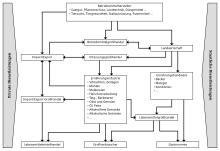Food and Feed Code
| Basic data | |
|---|---|
| Title: | Food, consumer goods and feed code |
| Short title: | Food and Feed Code |
| Abbreviation: | LFGB |
| Type: | Federal law |
| Scope: | Federal Republic of Germany |
| Legal matter: | Special administrative law |
| References : | 2125-44 |
| Original version from: | September 1, 2005 ( Federal Law Gazette I p. 2618 , ber.p. 3007 ) |
| Entry into force on: | September 7, 2005 |
| New announcement from: | June 3, 2013 ( BGBl. I p. 1426 ) |
| Last change by: |
Art. 97 VO of June 19, 2020 ( Federal Law Gazette I p. 1328, 1339 ) |
| Effective date of the last change: |
June 27, 2020 (Art. 361 of June 19, 2020) |
| Weblink: | Text of the law |
| Please note the note on the applicable legal version. | |
The Food and Feed Code (LFGB) (not to be confused with the Food Code) came into force as a federal law in Germany on September 7, 2005. It largely replaced the provisions of the Food and Commodities Act (LMBG). This means that German food law has been redesigned in accordance with the EU basic regulation that has been in force since January 1, 2005 and has thus become the umbrella law of German food law . The new LFGB covers all production and processing stages along the food value chain and applies not only to food and consumer goods but also to animal feed and cosmetics . The top priority is food safety . The manufacturer, dealer or distributor must ensure the perfect quality of the goods. All processing steps of agribusiness which is traceability of the products to be guaranteed.
Structure of the LFGB
The LFGB is made up of eleven sections, with section 2 regulating the movement of food and section 3 regulating the movement of feed . In the past, the same regulations did not apply to feed as did to food for humans.
Since various food scandals had their origin in the feed sector, a uniform legal framework was created in 2005 that applies equally to feed and food.
Scope of the LFGB
- Requirements of the basic regulation of the EU ( Regulation (EC) No. 178/2002 ) are included
- additional regulations for cosmetics and consumer goods
- Consumer health protection
- Protection against deception
- Informing consumers about food, cosmetic products and consumer goods
LMBG ↔ LFGB
Many paragraphs of the original LMBG can also be found in the new law. At the same time, the provisions on tobacco products are not contained in the LFGB, but remain in the original law, which has been renamed the Provisional Tobacco Act . It should be noted that the Basic Regulation and the LFGB apply in parallel, i.e. This means that both legal norms must be observed by those affected. At the moment, certain legal norms still refer to the previous LMBG. As long as these laws are not changed, the previous definitions contained therein continue to apply.
literature
- Thomas Claussen, Dirk Murmann, Hanspeter Rützler and others: Food law manual. Verlag CH Beck, Munich, ISBN 978-3-406-41833-4 . (Loose-leaf collection)
- G. Dannecker, D. Horny, I. Höhn, Th. Mettke, A. Preuß: LFGB - Commentary on the Food and Feed Code. Wissenschaftliche Verlagsgesellschaft, Stuttgart, ISBN 978-3-89947-090-1 . (Loose-leaf collection with CD-ROM)
- P. Hahn, S. Görgen: Practical Guide to Food Law. Scientific publishing company, Stuttgart, ISBN 978-3-86022-962-0 . (Loose-leaf collection with CD-ROM)
- P. Hahn, S. Görgen (Ed.): Practical Guide to Food Law . Behr's Verlag, Hamburg, 2007.
- P. Hahn: Lexicon of food law. Behrs Verlag, Hamburg 2007, ISBN 978-3-86022-334-5 . (Loose-leaf collection)
- Alfred Hagen Meyer, Rudolf Streinz (Ed.): LFGB, BasisVO. Comment. 2nd Edition. Verlag CH Beck, Munich 2011, ISBN 978-3-406-60084-5 .
- Andreas Wehlau: Commentary on the Food and Feed Code (LFGB). 1st edition. Heymanns publishing house, Cologne 2010, ISBN 978-3-452-26397-1 .
- Walter Zipfel, Kurt-Dietrich Rathke: Food law. Verlag CH Beck, ISBN 978-3-406-39820-9 . (Loose-leaf commentary in several volumes)
Web links
- Text of the law
- Regulation (EC) No. 178/2002 (PDF) ofthe European Parliament and of the Council of January 28, 2002 laying down the general principles and requirements of food law, establishing the European Food Safety Authority and laying down procedures for food safety
